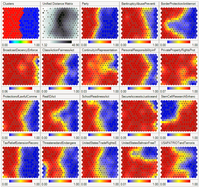
Photo from wikipedia
Abstract The aim of this paper is the development of an effective model based on deep learning for geological facies classification in wells. Facies classification is carried out by studying… Click to show full abstract
Abstract The aim of this paper is the development of an effective model based on deep learning for geological facies classification in wells. Facies classification is carried out by studying the lithological properties of rocks, which are characteristic of modern sediments, accumulating in certain physical and geographical conditions. In this study, a new 1D-CNN model, which is trained on various optimization algorithms, is proposed. The photoelectric effect, gamma ray, resistivity logging, neutron-density porosity difference, average neutron density porosity and geologic constraining variables are considered as input data of the model. Acceptable accuracy and the use of conventional well log data are the main advantages of the proposed intellectual model. The proposed model is compared with a recurrent neural network model, a long short-term memory model, a support vector machine model, and a k-nearest neighbor model and shows more accurate results in comparison with them. The model shows successful results in the study of well log data and can, therefore, be recommended as a suitable and effective approach for well log data processing required for lithological discrimination.
Journal Title: Journal of Petroleum Science and Engineering
Year Published: 2019
Link to full text (if available)
Share on Social Media: Sign Up to like & get
recommendations!